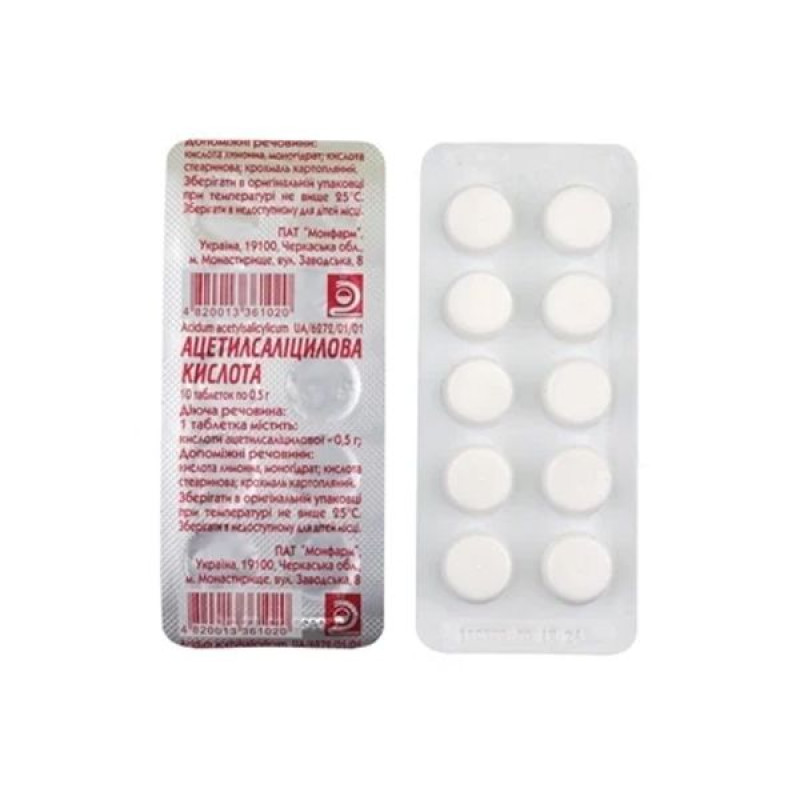Acetylsalicylic acid tablets 0.5 g blister No. 10

Acetylsalicylic acid (Aspirin) tablets are used to treat mild to moderate, acute pain syndrome (headache, toothache, pain in joints and ligaments, back pain).
Symptomatic treatment of fever and/or pain syndrome in colds.
Composition
Active ingredient: acetylsalicylic acid;
1 tablet contains acetylsalicylic acid - 500 mg;
Excipients: citric acid monohydrate, stearic acid, potato starch.
Contraindication
Hypersensitivity to acetylsalicylic acid, other salicylates or to any component of the drug. History of bronchial asthma caused by the use of salicylates or other (NSAIDs). Acute gastrointestinal ulcers. Hemorrhagic diathesis. Severe renal failure. Severe hepatic failure. Severe heart failure. Combination with methotrexate at a dose of 15 mg/week or more.Method of application
Acetylsalicylic acid should be taken orally after meals, with sufficient fluid.
Acetylsalicylic acid should not be used for longer than 3-5 days without consulting a doctor.
Adults and children over 15 years old 1-2 tablets once. Repeated administration is possible after 4-8 hours. The maximum daily dose should not exceed 4 g (8 tablets).
Warning: For patients with concomitant liver or kidney dysfunction, it is necessary to reduce the dose of the drug or increase the interval between applications.
Application features
Pregnant women
Acetylsalicylic acid can be used during pregnancy only if other medicines are not effective and only after assessing the risk/benefit ratio.
Despite this, acetylsalicylic acid is contraindicated in the third trimester of pregnancy.
Children
The drug can be used in children over 15 years of age.
Drivers
No effect on the ability to drive or use other mechanisms was noted.
Overdose
Salicylate toxicity (administration of more than 100 mg/kg/day for more than 2 days may lead to toxicity) is possible due to chronic intoxication resulting from prolonged therapy, as well as due to acute intoxication (overdose), which is potentially life-threatening and the causes of which may be, for example, accidental use by children or overdose.
Side effects
Gastrointestinal disorders: Dyspepsia, epigastric pain and abdominal pain, in some cases - inflammation of the gastrointestinal tract, erosive-ulcerative lesions of the gastrointestinal tract, which can in some cases cause gastrointestinal bleeding and perforation with corresponding laboratory and clinical manifestations.
Rarely - transient hepatic failure with increased liver transaminase levels.
Blood system. Due to its antiplatelet effect on platelets, acetylsalicylic acid may increase the risk of bleeding. Bleeding such as: intraoperative hemorrhages, hematomas, bleeding from the genitourinary system, epistaxis, bleeding from the gums; rarely or very rarely - serious bleeding such as gastrointestinal bleeding and cerebral hemorrhages (especially in patients with uncontrolled arterial hypertension and / or with concomitant use of antihemostatic agents), which rarely could be potentially life-threatening.
Bleeding can lead to acute and chronic posthemorrhagic anemia/iron deficiency anemia (due to so-called hidden microbleeding) with corresponding laboratory manifestations and clinical symptoms, such as asthenia, pallor of the skin, hypoperfusion.
Allergic reactions. In patients with individual hypersensitivity to salicylates, allergic reactions may develop, including symptoms such as rash, urticaria, edema, itching, rhinitis, and nasal congestion.
In patients with bronchial asthma, an increased frequency of bronchospasm and allergic reactions of mild to moderate severity, potentially affecting the skin, respiratory system, gastrointestinal tract and cardiovascular system, may occur. Severe reactions, including anaphylactic shock and non-cardiogenic pulmonary edema, have been observed very rarely.
Nervous system: Dizziness and tinnitus have been observed, which may indicate overdose.
Interaction
Contraindicated combinations.
The use of acetylsalicylic acid with methotrexate at a dose of 15 mg/week or more increases the hematological toxicity of methotrexate (reduction in renal clearance of methotrexate by anti-inflammatory agents and displacement of methotrexate from plasma protein binding by salicylates).
Ethyl alcohol contributes to damage to the mucous membrane of the gastrointestinal tract and prolongs bleeding time due to the synergism of acetylsalicylic acid and alcohol.
Storage conditions
In the original packaging at a temperature not exceeding 25 °C.
Keep out of reach of children.
Shelf life - 4 years.
There are no reviews for this product.
There are no reviews for this product, be the first to leave your review.
No questions about this product, be the first and ask your question.
